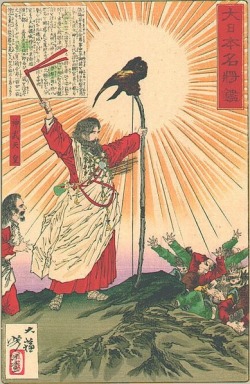History

Emperor period
The emperor Jimmu, who was a descendant of the sun goddess Ameterasu, founded Japan in around 600 BC. The Chinese culture had an immense influence on the Japan culture between the fifth and tenth century: Japan adopted the Chinese writing system, Buddhism and the administrative system.
Nowadays, you can still see this influence of the Chinese culture.
The most powerful social class was the samoerai during the emperior period. However, their power diminished in the 19th century. In this century, the emperor Mutsuhito implemented the Meiji revolution: Japan was transfromed from a feudal and isolated state into a world power. Compulsary education and military service, constitution, modern political parties and the Bank of Japan were one of the measures that created a modern social, educational, economic, military and industrial systems. As a result, there was a pressure on the structure of the Japanese society: the traders became more important and the samoerai lost their powerful position. For more information about the samoerai, see the paragraph samoerai farther on.
War with China and Russia
The foreign policy of Japan was also changed; they had the strategy to obtain colonies to secure resources for the upcoming industry. Japan regarded Korea as a potential threat to Japan. It was because of Korea that Japan became involved in war with China in 1894 and with Russia in 1904. Both wars gave Japan a free hand in Korea, which it formally annexed in 1910. Nowadays, the Japanese people does not like products, which have a name that sounds the same as China.
World Wars
Japan was not involved in the World War I. The postwar era brought Japan prosperity. Japan received official recognition as one of the "big five' of the new international order. However, the Japanese parliamentary government was not rooted deeply enough to withstand the economic and political pressures of the 1930s. Military leaders became increasingly influential. Japan still had the drift to expansion to secure resources. Moreover, the relationship between Japan and United States and Great Britain became hostile.
Japan signed the anti-Comentern pact with Nazi Germany and Italy. All these circumstances led to the Japanese attack on the United Stated at Pearl Harbor in Hawaii in December 1941. In six months, Japan captured the most important strategic bases in the Pacific Ocean.
In 1945, Japan had to capitulate. After years of war, resulting in the loss of 3 million Japanese and the atomic bombings of Nagasaki and Hiroshima, Japan signed an instrument of surrender in September. Japan lost all of its 'colonies' and retained only the home islands.
The last decades
Until April 1952, Japan was under control of the United States' Supreme Commander Douglas MacArthur (Supreme Command for Allies Powers). The objective was to make Japan a peaceful nation with a democratic government. Japan became a member of the United Nations in 1956. In 1978, Japan and China concluded a peace and friendship treaty, whereas the relation between Japan and the Western countries became worse by the unbridled export of products. Few years later, a Prime Minister of Japan strenghtened the relationship with the United States and increased the Japanese involvement in international question. However, many Japanese has a hard feeling to Americans.
Samurai Culture & Beliefs
Samurai culture is an amalgamation of Buddhism and Zen, and to a lesser extent Confucianism and Shinto. These religious beliefs explain the value of wisdom and serenity in this culture. Bushido, or the "Way of the Warrior" is a Japanese code of conduct within Samurai culture that continues to have an influence on societal roles and culture. This way of thinking emphasizes the following morals: frugality, loyalty, and honor until death. Bushido has been long ingrained in Japanese ideology, being traced back as early as the 9th century.
